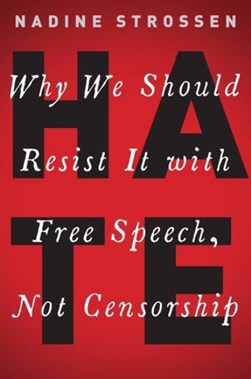-
BROWSE 1000s OF BOOKS IN STOCK
-
FREE DELIVERY ON ORDERS OVER €10
Hate
Hardback
Series: See all books in this series
HATE dispels misunderstandings plaguing our perennial debates about hate speech vs. free speech, showing that the First Amendment approach promotes free speech and democracy, equality, and societal harmony. We hear too many incorrect assertions that hate speech which has no generally accepted definition is either absolutely unprotected or absolutely protected from censorship. Rather, U.S. law allows government to punish hateful or discriminatory speech in specific contexts when it directly causes imminent serious harm, but government may not punish such speech solely because its message is disfavored, disturbing, or vaguely feared to possibly contribute to some future harm. When U.S. officials formerly wielded such broad censorship power, they suppressed dissident speech, including equal rights advocacy. Likewise, current politicians have attacked Black Lives Matter protests as hate speech. Hate speech censorship proponents stress the potential harms such speech might further: discrimination, violence, and psychic injuries. However, there has been little analysis of whether censorship effectively counters the feared injuries. Citing evidence from many countries, this book shows that hate speech laws are at best ineffective and at worst counterproductive. Their inevitably vague terms invest enforcing officials with broad discretion; predictably, regular targets are minority views and speakers. Therefore, prominent social justice advocates in the U.S. and beyond maintain that the best way to resist hate and promote equality is not censorship, but rather, vigorous counterspeech and activism.
€28.99

86 Reward Points
In stock online
Extended Range: Delivery in 2-3 working days
Extended Range: Delivery in 2-3 working days
Free Delivery on this item
Any purchases for more than €10 are eligible for free delivery anywhere in the UK or Ireland!
HATE dispels misunderstandings plaguing our perennial debates about hate speech vs. free speech, showing that the First Amendment approach promotes free speech and democracy, equality, and societal harmony. We hear too many incorrect assertions that hate speech which has no generally accepted definition is either absolutely unprotected or absolutely protected from censorship. Rather, U.S. law allows government to punish hateful or discriminatory speech in specific contexts when it directly causes imminent serious harm, but government may not punish such speech solely because its message is disfavored, disturbing, or vaguely feared to possibly contribute to some future harm. When U.S. officials formerly wielded such broad censorship power, they suppressed dissident speech, including equal rights advocacy. Likewise, current politicians have attacked Black Lives Matter protests as hate speech. Hate speech censorship proponents stress the potential harms such speech might further: discrimination, violence, and psychic injuries. However, there has been little analysis of whether censorship effectively counters the feared injuries. Citing evidence from many countries, this book shows that hate speech laws are at best ineffective and at worst counterproductive. Their inevitably vague terms invest enforcing officials with broad discretion; predictably, regular targets are minority views and speakers. Therefore, prominent social justice advocates in the U.S. and beyond maintain that the best way to resist hate and promote equality is not censorship, but rather, vigorous counterspeech and activism.

86 Reward Points
Any purchases for more than €10 are eligible for free delivery anywhere in the UK or Ireland!
€28.99

86 Reward Points
Any purchases for more than €10 are eligible for free delivery anywhere in the UK or Ireland!
Series: See all books in this series
Product Description
HATE dispels misunderstandings plaguing our perennial debates about hate speech vs. free speech, showing that the First Amendment approach promotes free speech and democracy, equality, and societal harmony. We hear too many incorrect assertions that hate speech which has no generally accepted definition is either absolutely unprotected or absolutely protected from censorship. Rather, U.S. law allows government to punish hateful or discriminatory speech in specific contexts when it directly causes imminent serious harm, but government may not punish such speech solely because its message is disfavored, disturbing, or vaguely feared to possibly contribute to some future harm. When U.S. officials formerly wielded such broad censorship power, they suppressed dissident speech, including equal rights advocacy. Likewise, current politicians have attacked Black Lives Matter protests as hate speech. Hate speech censorship proponents stress the potential harms such speech might further: discrimination, violence, and psychic injuries. However, there has been little analysis of whether censorship effectively counters the feared injuries. Citing evidence from many countries, this book shows that hate speech laws are at best ineffective and at worst counterproductive. Their inevitably vague terms invest enforcing officials with broad discretion; predictably, regular targets are minority views and speakers. Therefore, prominent social justice advocates in the U.S. and beyond maintain that the best way to resist hate and promote equality is not censorship, but rather, vigorous counterspeech and activism.
Product Details
ISBN9780190859121
FormatHardback
PublisherOXFORD UNIVERSITY PRESS (28 June. 2018)
No. of Pages0
Weight351
Language English
Dimensions 216 x 149 x 21.3

